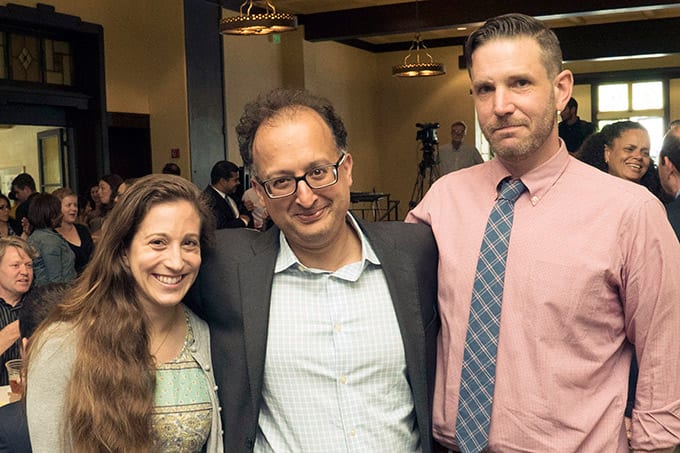
By Andrew Cohen
While enormously grateful to receive Berkeley Law’s annual Sax Prize for Clinical Advocacy, Abigail Ludwig ’15 saw the irony in being singled out
“Law school is often an exercise in individualism,” she said. “But the clinics teach us how to be part of a team. Good teamwork, like good leadership, inspires us and makes the collective output better than the individual input. And I’ve had just about the best teammates a clinical student could ask for.”
Honored April 27 at the Bancroft Hotel in Berkeley, Ludwig was chosen from a group of nominees who worked at Berkeley Law’s various legal clinics. Named for the late Brian Sax ’69, a respected San Francisco litigator and Berkeley Law lecturer, the prize is given to a graduating legal clinic student who displays excellence in advocacy and professional judgment.
Ludwig gained valuable experience last year with the International Human Rights Law Clinic (IHRLC), and this year with the Youth Defender Clinic at the East Bay Community Law Center (EBCLC).
“The time I spent in the clinics was the single most rewarding experience I’ve had in law school,” said Ludwig, who will begin working in the New York office of Sullivan & Cromwell this fall. “Over the past two years, I’ve met the people who have inspired me, motivated me, and taught me how to be a lawyer.”
At IHRLC, Ludwig promoted justice for male victims of conflict-related sexual violence in Uganda. She provided advice and counsel to activists, working with them closely to develop a human rights litigation strategy. Ludwig’s team successfully advocated for the International Criminal Court Prosecutor to strengthen her commitment to justice for male survivors as a matter of policy.
At the Youth Defender Clinic, Ludwig helped extricate clients from the juvenile justice system so they could return to school and live at home. Her trial performance representing a homeless teenager prosecuted for trespass drew high praise from the client, his mother, and the judge.
Ludwig’s clinical supervisors—IHRLC Director Laurel Fletcher and Youth Defender Clinic Director Kate Weisburd—hailed her tireless work ethic and deft legal skills. Weisburd saw Ludwig’s attention to detail in her very first case, when she represented a homeless teenager in juvenile court who was charged with trespass (among other related offenses) looking for a place to sleep in a Berkeley parking garage.
“Abby spent countless hours tracking down witnesses, researching search and seizure law, and counseling her client,” Weisburd said. “She filed suppression motions, discovery demands, and argued at multiple pretrial hearings. Abby also worked closely with EBCLC’s new social work program to identify and connect both her client and his mother with social services.”
Fighting injustice
Ludwig noted that the United States incarcerates more people than any other nation, and that the majority of prisoners are indigent and young men of color. Calling the adult prison system’s racial and class disparities “appalling,” she saw the same problem hold true in the juvenile system.
“It’s a profound injustice that the people who are the most marginalized and the most in need of the legal system’s protection are the least likely to receive it,” Ludwig said. “The clinics’ lawyers, students, and support staff chip away daily at this status quo. They’re relentless in their pursuit of justice, even though it is often elusive. … They give voices to people who otherwise would not be heard and, in so doing, touch countless lives.”
IHRLC Associate Director Roxanna Altholz ’99 emceed the Sax Prize ceremony. Some of Berkeley Law’s top clinical instructors—Death Penalty Clinic lecturer Christina Spaulding; Altholz; EBCLC Executive Director Tirien Steinbach ’99; and Samuelson Law, Technology & Public Policy Clinic Associate Director Catherine Crump—described their students’ wide-ranging achievements over the past year.
Runner-up Scott Wallace ’15 received the honorable mention award for his exemplary work with the Death Penalty Clinic and EBCLC’s Clean Slate Practice. This year, he worked feverishly on behalf of a death-row inmate whose legal team is preparing a petition for post-conviction relief. Wallace’s efforts spanned researching the law of post-conviction proceedings, preparing the client’s mental health history, and interviewing witnesses to develop a comprehensive social history.
Last year, Wallace assisted a young man with a history of substance abuse and mental health challenges as he struggled to live on his own after years in foster care—and with the weight of probation deterring his chances of employment. Wallace’s advocacy helped the client successfully terminate his probation early and start living independently.
Clean Slate Director Eliza Hersh ’05 commended Wallace’s “wisdom, deep empathy, and very keen sense of judgment. He mastered the balance of acknowledging his clients’ dignity while confronting the systematic injustices that trap them.”
After graduation, Wallace will join the Phillips Black Project in San Francisco, working on death penalty cases and national policies around other criminal punishments barred by the Eighth Amendment.
—